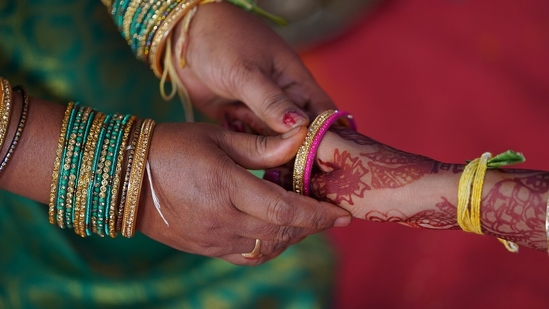Mother of 3 converts to marry Class 12 student in UP’s Amroha

Woman’s Conversion to Hinduism and Marriage in Uttar Pradesh Sparks Attention
A 30-year-old woman from Amroha, Uttar Pradesh, recently converted to Hinduism and married an 18-year-old Class 12 student named Shiva. This decision has attracted considerable attention, particularly in light of Uttar Pradesh’s strict anti-conversion law. Shabnam, who is now known as Shivani, is a mother of three children and has been married twice before.
Shivani’s Conversion and New Marriage
Shivani’s conversion to Hinduism and subsequent marriage to Shiva have sparked public interest. Her first marriage, which took place in Meerut, ended in divorce. Later, she married Taufiq, who became disabled following a road accident in 2011. Recently, Shivani formed a relationship with Shiva, which led her to file for divorce from Taufiq last week. Shortly after, she converted to Hinduism and changed her name to Shivani.
While the police are reviewing the situation, they have not yet registered any complaints. Currently, there is no indication that Shivani’s conversion and marriage violate the law. The anti-conversion law in Uttar Pradesh primarily aims to prevent forced conversions, but Shivani’s actions do not appear to fall under its prohibitions.
Support from Shiva’s Family
Shivani’s new husband, Shiva, and his family have expressed their full support for the couple. Shiva’s father, Dataram Singh, publicly supported their decision, saying that the family is happy as long as the couple is happy. He also expressed hope that they live peacefully together.
The Anti-Conversion Law in Uttar Pradesh
The Uttar Pradesh Prohibition of Unlawful Conversion of Religion Act, 2021, regulates religious conversions to ensure they are voluntary and free of coercion. The law mandates that individuals must notify the district magistrate at least two months before converting. It also requires individuals in interfaith marriages involving conversion to obtain approval from authorities.
While this law aims to protect individuals from forced conversions, it has sparked debate about its impact on personal freedoms. In Shivani’s case, the authorities have not filed complaints or taken action. The police continue to review the situation, and it does not appear that Shivani’s actions directly violate the law.
Legal Precedents and Court Observations
The Allahabad High Court, in a 2022 ruling, upheld the anti-conversion law, emphasizing its role in safeguarding religious freedom while preventing coercion. The court reaffirmed that individuals have the right to practice and propagate their religion. It also clarified that forced conversions are not allowed, maintaining the balance between individual rights and the need for social harmony.
Shivani’s case provides an example of how the law may be applied to voluntary conversions and interfaith marriages. No legal challenges have arisen so far, and the authorities have not indicated any intention to take action against Shivani.
The Ongoing Review of the Situation
Currently, no formal legal complaints have been filed regarding Shivani’s case. Although the police are reviewing the situation, no further action has been taken as of now. Authorities may continue monitoring the case due to the sensitivity of religious conversions in Uttar Pradesh.
Shivani’s family and her new husband remain supportive of her decisions, and they hope for a peaceful life together. The outcome of this case will depend on how the authorities proceed, but it is unlikely that significant legal action will take place without further developments.
Conclusion: Striking a Balance Between Personal Rights and Legal Protections
Shivani’s decision to convert to Hinduism and marry Shiva raises important questions about personal freedom, religious rights, and the application of Uttar Pradesh’s anti-conversion law. Though no legal challenges have been filed, the police continue to review the situation. The case could influence future legal discussions about balancing individual freedoms with state-enforced protections.
For now, Shivani and her family have received support, and the situation remains under review. The full impact of this case on the state’s legal landscape will become clearer as authorities continue to assess it.






